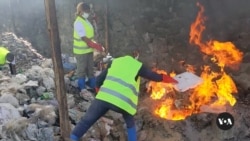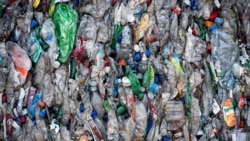ຢູ່ເມືອງ ໂກມາ (Goma) ທີ່ເປັນເມືອງນຶ່ງຂອງສາທາລະນະລັດ ປະຊາທິປະໄຕ ຄອງໂກ ຫຼື ສປ ຄອງໂກ ແມ່ຍິງຄົນນຶ່ງເປັນຜູ້ບໍລິຫານ ບໍລິສັດໝູນໃຊ້ຄືນໃໝ່ ຫຼື recycle ທີ່ກຳລັງຮັບມືກັບມົນລະພິດຂອງຢາງພລາສຕິກ....ແລະສ້າງວຽກເຮັດງານທຳ ໃຫ້ແກ່ປະຊາຊົນຂອງປະເທດ ຈຳນວນຫຼາຍລ້ານຄົນທີ່ໄດ້ຖືກພັດພາກຈາກຖິ່ນຖານພາຍໃນປະເທດ. ນັກຂ່າວ ຊາເນມ ເນຕີ ຊາອີດີ ນຳພວກເຮົາເຂົ້າໄປເບິ່ງພາຍໃນທຸລະກິດຂອງນັກລົງ ທຶນທ່ານນີ້ ເຊິ່ງ ໄຊຈະເລີນສຸກ ຈະນຳລາຍລະອຽດມາສະເໜີທ່ານ ໃນອັນ ດັບຕໍ່ໄປ.
ທ່ານນາງ ໄອຣີເນ ມາໂຣຍ ເປັນຜູ້ຈັດການຢູ່ທີ່ ກຸ່ມບາກບັ່ນເພື່ອການພັດທະນາ ຫຼືເອີ້ນຫຍໍ້ວ່າ RDG (Resilience for Development Group) ເຊິ່ງເປັນທຸລະກິດທີ່ແມ່ຍິງເປັນເຈົ້າຂອງ ໂດຍຫັນປ່ຽນສິ່ງເສດເຫຼືອທີ່ເປັນຢາງ ພລາສຕິກ ມາເປັນຫີນບລັອກປູພື້ນ ທີ່ເປັນມິດຕໍ່ສິ່ງແວດລ້ອມ ເຊິ່ງມີສຳນັກງານຕັ້ງຢູ່ເມືອງໂກມາ, ໃນປະເທດ ສປ ຄອງໂກ, ບໍລິສັດດັ່ງກ່າວ ສະໜອງວຽກເຮັດງານທຳໃຫ້ປະຊາຊົນທີ່ໄດ້ຖືກພັດພາກຈາກຖິ່ນຖານຍ້ອນສົງ ຄາມທີ່ແກ່ຍາວມາຫຼາຍປີ.
ທ່ານນາງມາໂຣຍ ກ່າວວ່າ ຈຸດເພັ່ງເລັງຂອງລາວ ແມ່ນຢູ່ນຳພວກຊາວໜຸ່ມ ທີ່ໄດ້ຖືກພັດພາກຈາກຖິ່ນຖານພາຍໃນປະເທດ ໂດຍຫວັງວ່າ ຈະປ້ອງກັນ ພວກເຂົາຈາກການເຂົ້າຮ່ວມພວກກຸ່ມຕິດອາວຸດທັງຫຼາຍ.
ທ່ານນາງ ມາໂຣຍ ຜູ້ຈັດການບໍລິສັດ RDG ກ່າວໃນພາສາຝຣັ່ງວ່າ “ເມື່ອຂ້ອຍເຫັນພວກໄວໜຸ່ມຫຼາຍໆຄົນ ຫັນໄປເຂົ້າພວກກຸ່ມຕິດອາວຸດ ເນື່ອງຈາກວ່າ ພວກເຂົາບໍ່ມີວຽກເຮັດ, ຂ້ອຍກໍຮູ້ວ່າ ຂ້ອຍມີໜ້າທີ່ຕ້ອງຊ່ອຍ ພວກເຂົາ. ແລະເມື່ອສົງຄາມກົດດັນພົນລະເມືອງຂອງພວກເຮົາໃຫ້ຫລົບໜີ ເຂົ້າໄປໃນເມືອງ ຂ້ອຍຈຶ່ງໄດ້ຕັດສິນໃຈສະໜັບສະໜູນພວກທີ່ຖືກພັດພາຈາກ ຖິ່ນຖານຈຳນວນນຶ່ງ ໂດຍຊື້ສິ່ງເສດເຫຼືອທີ່ເປັນຢາງພລາສຕິກທີ່ພວກເຂົາເກັມ ມານັ້ນ. ຍ້ອນອັນນີ້, ຫຼາຍໆຄົນ-ໂດຍສະເພາະແມ່ນພວກແມ່ຍິງ-ບັດນີ້ ສາມາດລ້ຽງຄອບຄົວຂອງພວກເຂົາເຈົ້າ.”
ມາເຖິງເດືອນເມສາ ປີ 2024, ບໍລິສັດ RDG ມີຄົນງານທີ່ຖືກພັດພາກຈາກ ຖິ່ນຖານພາຍໃນປະເທດ 6 ລ້ານ 8 ແສນຄົນ ອີງຕາມອົງການສະຫະ ປະຊາຊາດ.
ທ້າວ ໂບນີຟາສ ໄຄນາ ຜູ້ເປັນພໍ່ຂອງລູກເຈັດຄົນ, ແມ່ນນຶ່ງໃນພວກຄົນງານ ດັ່ງກ່າວ. ລາວກ່າວວ່າ ລາວຂອບອົກນຂອບໃຈທີ່ມີ ວຽກເຮັດກັບ ບໍລິສັດ RDG.
ທ້າວ ໄຄນາ ພະນັກງານຢູ່ ບໍລິສັດ RDG ກ່າວເປັນພາສາ ສະວາຮີລີ ວ່າ “ຍ້ອນບາລະມີຂອງພະເຈົ້າ, ຂ້ອຍຈຶ່ງໄດ້ພົບກັບ ທ່ານນາງໄອຣີນາ. ລາວໄດ້ສອນຂ້ອຍ ວິທີຫັນປ່ຽນສິ່ງເສດເຫຼືອທີ່ເປັນຢາງພລາສຕິກ ໃຫ້ກາຍ ເປັນຫີນບລັອກປູພື້ນທີ່ເປັນມິດຕໍ່ສິ່ງແວນລ້ອມ. ຂ້ອຍຂໍຂອບອົກຂອບໃຈ ເພາະວ່າ ໃນວັນທີ 15 ແລະ ວັນທີ 30 ຂອງແຕ່ລະເດືອນ, ຂ້ອຍໄດ້ຮັບ ເງິນເດືອນ ກ່ອນໜ້ານີ້ ອົງການອາຫານໂລກ ຫຼື WFP ຊ່ອຍເຫຼືອພວກເຮົາ ໃນສູນອົບພະຍົບ. ເງິນທີ່ຂ້ອຍໄດ້ມານັ້ນ ຊ່ອຍຂ້ອຍແລະຄອບຄົວຂອງຂ້ອຍ ໃຫ້ລອດຊີວິດ.”
ບໍລິສັດດັ່ງກ່າວ ຍັງແນໃສ່ເພື່ອເຮັດໃຫ້ສິ່ງເສດເຫຼືອທີ່ເປັນຢາງພລາສຕິກ ຫລຸດຜ່ອນລົງ. ເກືອບເວລາສາມປີຜ່ານມາ, ຫີນປູພື້ນທີ່ຜະລິດໂດຍບໍລິສັດ ໄດ້ຊ່ອຍເຮັດໃຫ້ເມືອງໂກມາ ສະອາດຂຶ້ນ ແລະໄດ້ຖືກນຳໄປປູໃສ່ໃນດິນບ້ານ ຄົນຫຼາຍແຫ່ງນຳດ້ວຍ ລູກຄ້າຜູ້ນຶ່ງ ທ້າວ ໂກລຍ ມູຮິນໂດ (Gloire Muhindo) ກ່າວ.
ທ້າວ ມູຮິນໂດ ກ່າວເປັນພາສາສະວາຮີລີ ວ່າ “ຂ້ອຍເລືອກຊື້ຫີນບລັອກ ປູພື້ນເຫຼົ່ານີ້ ຕົ້ນຕໍ ກໍຍ້ອນວ່າ ມັນຜະລິດຢູ່ໃນທ້ອງຖິ່ນ, ເຊິ່ງແທ້ຈິງແລ້ວ ມັນເປັນແຮງຈູງໃຈຂ້ອຍ. ພວກມັນຖືກຜະລິດຈາກສິ່ງເສດເຫຼືອທີ່ເປັນຢາງ ພລາສຕິກ-ຄືພວກຖົງຢາງ ແລະກະຕຸກຢາງ-ອັນນັ້ນແຫລະຊະຊາຍ ໃນເມືອງຂອງພວກເຮົາ. ການສະໜັບສະໜູນໂຄງການລິເລີ້ມນີ້ ບໍ່ພຽງແຕ່ເປັນການສົ່ງເສີມການໝູນໃຊ້ຄືນໃໝ່ ແຕ່ຍັງຊ່ອຍຮັກສາຄວາມ ສະອາດຂອງເມືອງເຮົານຳດ້ວຍ.”
ທີມງານຂອງທ່ານນາງ ມາໂຣຍ ກ່າວວ່າ ພວກເຂົາໄດ້ໝູນໃຊ້ຢາງພລາສະຕິກ ປະມານສິບໂຕນໃນແຕ່ລະເດືອນ ຢູ່ໃນເມືອງໂກມາ. ທ່ານນາງ ກ່າວວ່າ ລາວໄດ້ບັນລຸສອງເປົ້າໝາຍກໍຄື: ຕໍ່ສູ້ສິ່ງເສດເຫຼືອທີ່ເປັນຢາງພລາສຕິກ ແລະ ຊ່ອຍເຫຼືອພວກຄົນທີ່ຖືກພັດພາກຈາກຖິ່ນຖານຍ້ອນສົງຄາມ ໃຫ້ເພິ່ງພາ ຕົນເອງໄດ້ຫຼາຍຂຶ້ນ.
In Goma, a town in the Democratic Republic of Congo, a woman-led recycling company is tackling plastic pollution... and creating jobs for some of the country’s millions of internally displaced people. Reporter Zanem Nety Zaidi takes us inside this entrepreneur’s business.
Irene Maroy is a manager at the Resilience for Development Group, (1) or RDG, a woman-owned business that turns plastic waste into eco-friendly paving stones. Based in Goma, in the Democratic Republic of Congo, the company provides jobs for people displaced by years of war.
Maroy says her focus is on young internally displaced people, hoping to prevent them from joining armed groups.
(Irene Maroy, Resilience for Development Group Manager)
“When I saw so many young people turning to armed groups because they had no jobs, I knew I had a duty to help. And when war forced our fellow citizens to flee to the city, I decided to support some of the displaced by buying the plastic waste they collect. Thanks to this, many—especially women—are now able to provide for their families.”
As of April 2024, the DRC had 6.8 million internally displaced people, according to the United Nations. (2)
Boniface Kayna, a father of seven, is one of them. He says he is grateful for the job with RDG.
(Boniface Kayna, Resilience for Development Group Employee)
“By the grace of God, I met Irene. She taught me how to turn plastic waste into eco-friendly paving stones. I’m grateful because, on the 15th and 30th of each month, I get paid before the World Food Program assists us in the camp. That money helps me and my family survive.”
The company also aims to make a dent in plastic waste. For almost three years, the paving stones produced by the company have helped clean up the city of Goma and have been laid in private plots as well, says customer Gloire Muhindo.
Gloire Muhindo, Customer)
“I chose to buy these paving stones mainly because they’re made locally, which really motivated me. They’re made from plastic waste—like bags and bottles—that litter our city. Supporting this initiative not only promotes recycling but also helps keep our city clean.”
Maroy’s team say they are recycling about ten tons of plastic every month in Goma. She says she is accomplishing two goals: fighting plastic waste and helping war-displaced people become more self-reliant.







ຟໍຣັມສະແດງຄວາມຄິດເຫັນ